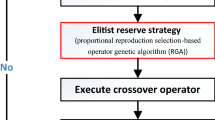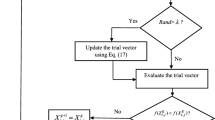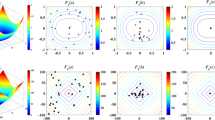Abstract
For the specialty of cascade reservoirs optimization and the premature convergence of GA, several improvement strategies are presented in this paper. Firstly, solution space generation method is found application to generate feasible initial population. Secondly, chaos optimization is adopted to optimize initial population. Thirdly, new selective operators, trigonometric selective operators, are proposed to overcome the fitness requirement of non-negative and to maintain the diversity of population. Fourthly, adaptive probabilities of crossing and mutation are adopted in order to improve the convergence speed of GA. Besides, elitist strategy is used to ensure that the best individual can be remained in each generation. Furthermore, the performance of these proposed improvement strategies was checked against the historical improvement strategies by simulating optimal operation of Three Gorges cascade reservoirs premised on historical hourly inflows, and the comparison yields indications of superior performance. In these proposed improvement strategies, trigonometric selective operators are feasible and effective for optimizing operation of cascade reservoirs. These new selective operators could help GA to find a more excellent solution in the same algebra, and the performance of convergence speed is advanced. Adaptive probabilities of crossing and mutation have better performance than other improvement strategies, such as annealing chaotic mutation and simulated annealing of large probability of mutation, because this method realizes the twin goals of maintaining diversity in the population and advancing the convergence speed of GA.










Similar content being viewed by others
References
Al Jadaan O, Rajamani L, Rao CR (2008) Improved selection operator for GA. Journal of Theoretical and Applied Information Technology 4(4):269–277
Arce A, Ohishi T, Soares S (2002) Optimal dispatch of generating units of the Itaipu Hydroelectric Plant. IEEE Trans Power Syst 17(1):154–158
Barros MT, Tsai FT, Yang SL, Lopes JE, Yeh WW (2003) Optimization of large-scale hydropower system operations. J Water Resour Plan Manag 129(3):178–188
Burn DH, Yulianti JS (2001) Waste-load allocation using genetic algorithms. J Water Resour Plan Manag 127(2):121–129
Chang FJ, Chen L (1998) Real-coded genetic algorithm for rule-based flood control reservoir management. Water Resour Manag 12:185–198
Chang SC, Chen CH, Fong IK, Luh PB (1990) Hydroelectric generation scheduling with an effective differential dynamic programming algorithm. IEEE Trans Power Syst 5(3):737–741
Chang JX, Huang Q, Wang YM (2005) Genetic algorithms for optimal reservoir dispatching. Water Resour Manag 19(4):321–331
Chau KW, Albermani F (2003) Knowledge-based system on optimum design of liquid retaining structures with genetic aalgorithms. J Struct Engi ASCE 129(10):1312–1321
Chen D, Huang GB, Chen QW, Jin F (2010) Implementing eco-friendly reservoir operation by using genetic algorithm with dynamic mutation operator. LSMS/ICSEE LNBI 6330:509–516
Cheng CT, Wang WC, Xu DM, Chau KW (2008) Optimizing hydropower reservoir operation using hybrid genetic algorithm and chaos. Water Resour Manag 22:895–909
Goldberg DE (1989b) Genetic algorithm in search. Optim Mach Learn. Reading, MA: Addison-Wesley
Goldberg DE, Korb B, Deb K (1989) Mess genetic algorithm: motivation, analysis and first result. Complex Syst 3:493–530
He L, Wang GQ, Fu XD (2010) Disaggregation model of daily rainfall and its application in the Xiaolihe watershed, Yellow River. J Environ Inform 16(1):11–18
Holland JH (1975) Adaptation in natural and artificial systems: an introductory analysis with applications to biology, control and artificial intelligence. U Michigan Press
Jing L, Chen B (2011) Field investigation and hydrological modelling of a subarctic wetland - the Deer River watershed. J Environ Inform 17(1):36–45
Jong KAD (1985) Genetic algorithms: a 10 year perspective. Proc Int Conf Genet Algorithm Appli 169–177
Labadie JW (2004) Optimal operation of multireservoir systems: state-of-the-art review. J Water Resour Plan Manag 130(2):93–111
Li G, Zou J, Zhang B (2010) The genetic algorithm simulated annealing of large probability of mutation and its application in reservoir optimization. China Rural Water Hydropower 3:148–151 (In Chinese)
Louati MH, Benabdallah S, Lebdi F, Milutin D (2011) Application of a genetic algorithm for the optimization of a complex reservoir system in Tunisia. Water Resour Manag 25:2387–2404
Loucks DP, Stedinger JR, Haith DA (1981) Water resource systems planning and analysis. Prentice-Hall, Englewood Cliffs
May RM (1976) Simple mathematical models with very complicated dynamics. Nature 261:459–467
Mei YD, Zhu JX (2002) Short-term optimal operation model for the cascade hydroelectric station on the Upper Yellow River and its solution. J Hydroelectric Eng 2:1–7 (In Chinese)
Naccarino J, Cheung R, Briggs W, Mayur N (1988) Real-time monitoring, optimization and control of a hydroelectric complex. IEEE Trans Power Syst 3(4):1469–1783
Oliveira R, Loucks DP (1997) Operating rules for multireservoir systems. Water Resour Manag 33(4):839–852
Pursimo JM, Antila HK, Vilkko MK, Lautala PA (1998) A short-term scheduling for a hydropower plant chain. Electr Power Energy Syst 20(8):525–535
ReVelle C (1997) Chapter 1: water resources: surface water Systems. In: ReVelle C, McGarity AE (eds) Design and operation of civil and environmental engineering systems. Wiley, New York, pp 1–39
Simonovic SP (1992) Reservoir systems analysis: closing gap between theory and practice. J Water Resour Plan Manag 1183:262–280
Srinivas M, Patnaik LM (1994) Adaptive probabilities of crossover and mutation in genetic algorithms. IEEE Trans Syst Man Cybern 24(4):656–667
Suo MQ, Li YP, Huang GH (2011) An inventory-theory-based interval-parameter two-stage stochastic programming model for water resources management. Eng Optim 43(9)
Tang HH, Chen SL, Zhao Y (2008) Model and algorithm of short-term optimal scheduling of three gorges cascaded hydropower stations. Water Resour Power 26(3):133–136 (In Chinese)
Yan HZ, Luh PB, Guan XH (1993) Schedule of hydrothermal power system. IEEE Trans Power Syst 8(3):1358–1365
Yang JS, Chen NM (1989) Short term hydrothermal coordination using muti-pass programming. IEEE Trans Power Syst 4(3):1050–1056
Yang K, Liu YB (2001) System decomposition-coordination macro-decision method for reservoirs based on multi-objective analysis. Adv Water Sci 12(2):232–236 (In Chinese)
Yeh WWG (1985) Reservoir management and operation models: a state-of-the-art review. Water Resour Res 21(12):1797–1818
Yong L, Leung KS (2011) Genetic Algorithm with adaptive elitist-population strategies for multimodal function optimization. Appl Soft Comput 11:2017–2034
Zalzala AM, Fleming PJ (1997) Genetic algorithms in engineering system. The Institution of Electrical Engineers, London
Acknowledgments
The achievements are funded by the National Key Basic Research Program of China (973 Program) (2012CB417006) and the National Science Support Plan Project of China (2009BAC56B03).
Author information
Authors and Affiliations
Corresponding author
Additional information
The achievements are funded by the National Key Basic Research Program of China (973 Program) (2012CB417006) and the National Science Support Plan Project of China (2009BAC56B03).
Rights and permissions
About this article
Cite this article
Yang, K., Zheng, J., Yang, M. et al. Adaptive Genetic Algorithm for Daily Optimal Operation of Cascade Reservoirs and its Improvement Strategy. Water Resour Manage 27, 4209–4235 (2013). https://doi.org/10.1007/s11269-013-0403-3
Received:
Accepted:
Published:
Issue Date:
DOI: https://doi.org/10.1007/s11269-013-0403-3




